上海牛津版8年级下册代词精讲及巩固提升练习(有答案)
文档属性
| 名称 | 上海牛津版8年级下册代词精讲及巩固提升练习(有答案) |
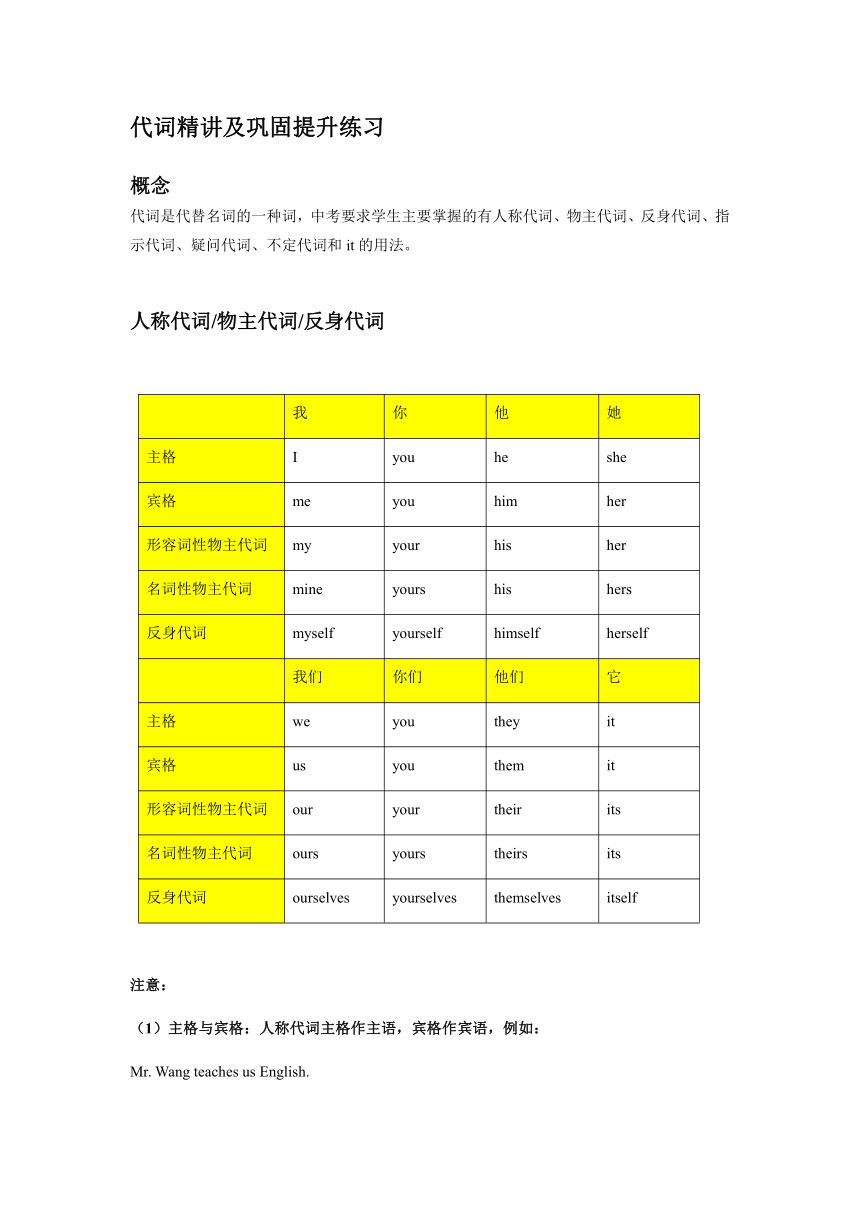
|
|
| 格式 | docx | ||
| 文件大小 | 28.9KB | ||
| 资源类型 | 教案 | ||
| 版本资源 | 牛津上海版(试用本) | ||
| 科目 | 英语 | ||
| 更新时间 | 2021-01-13 00:00:00 | ||
图片预览

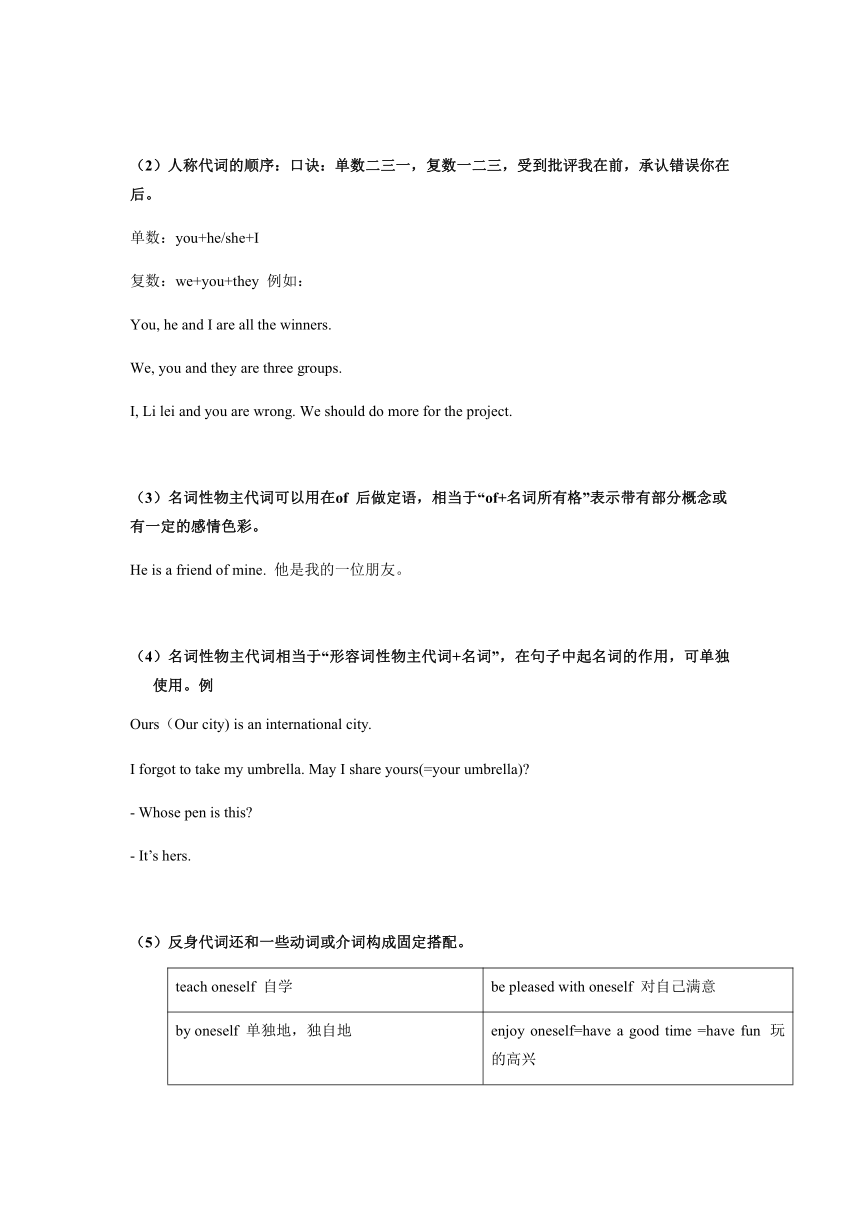
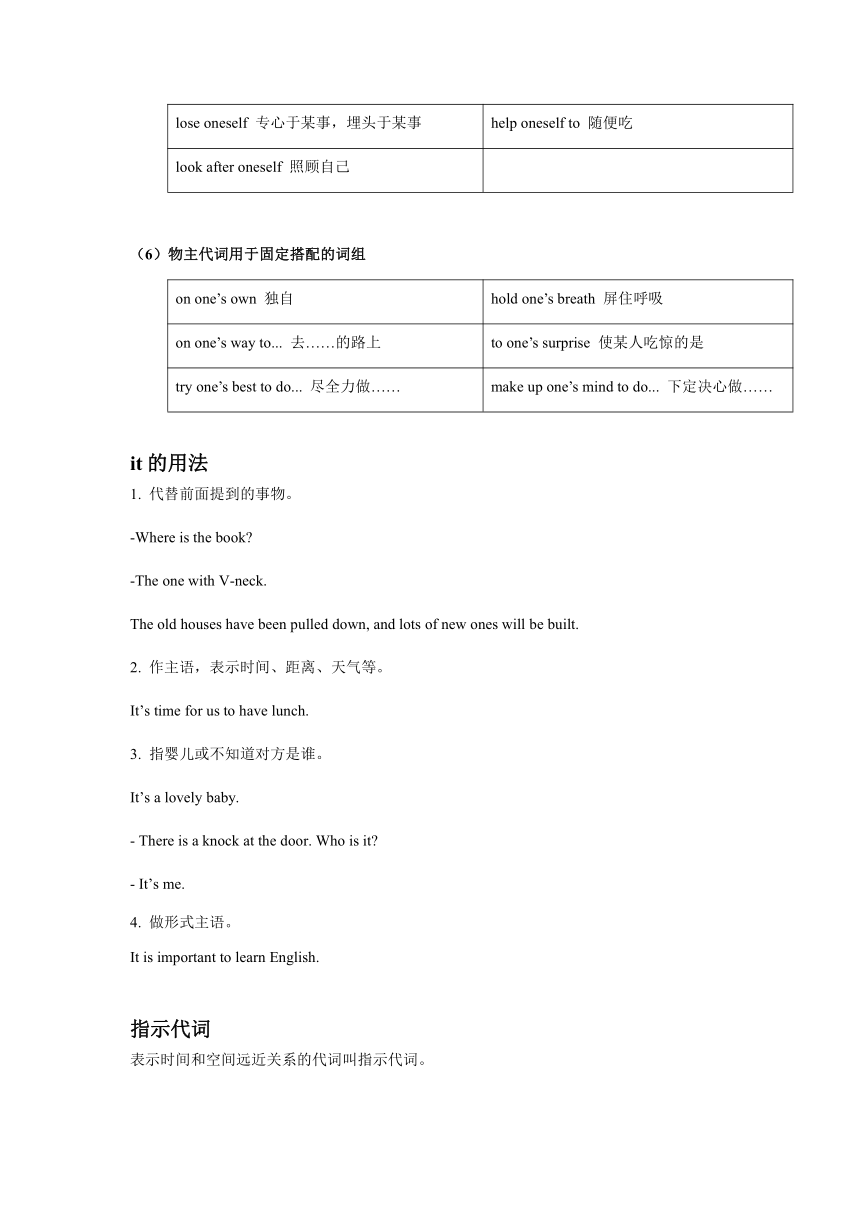
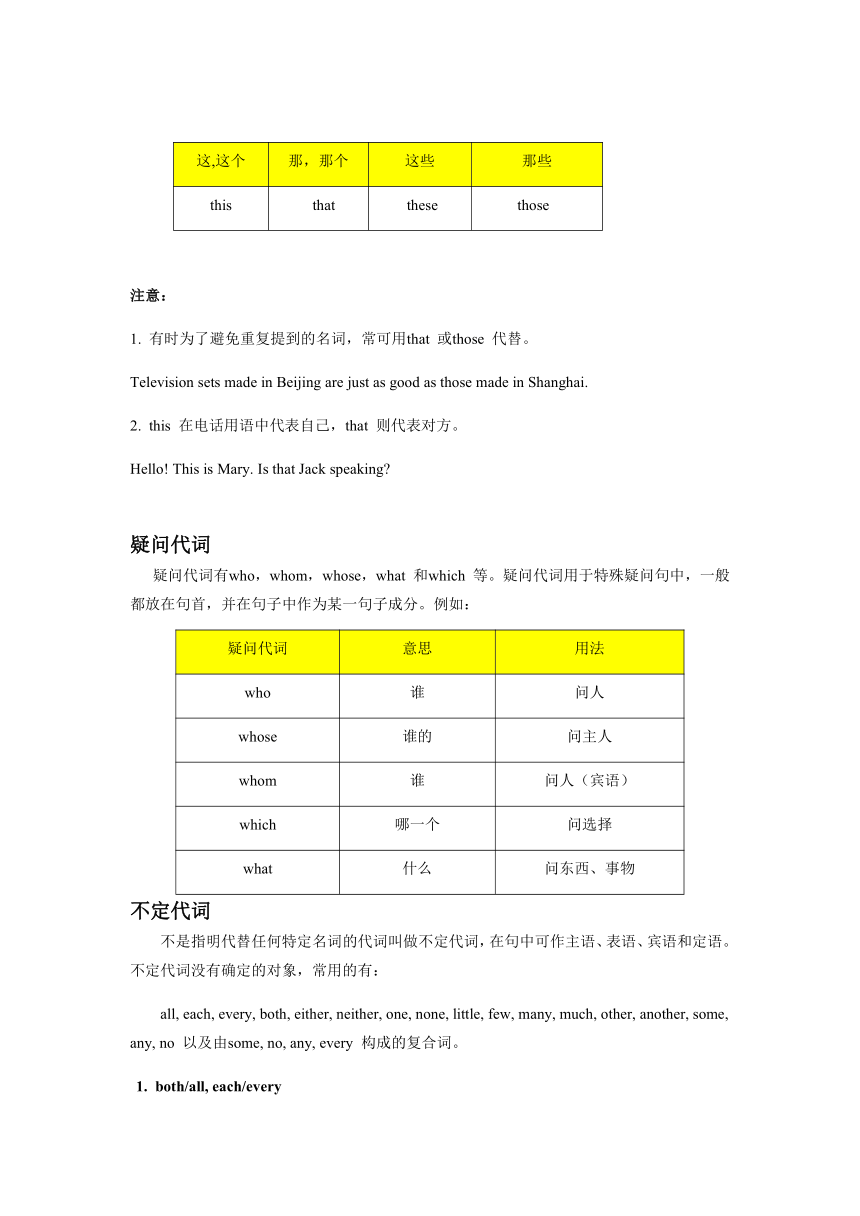
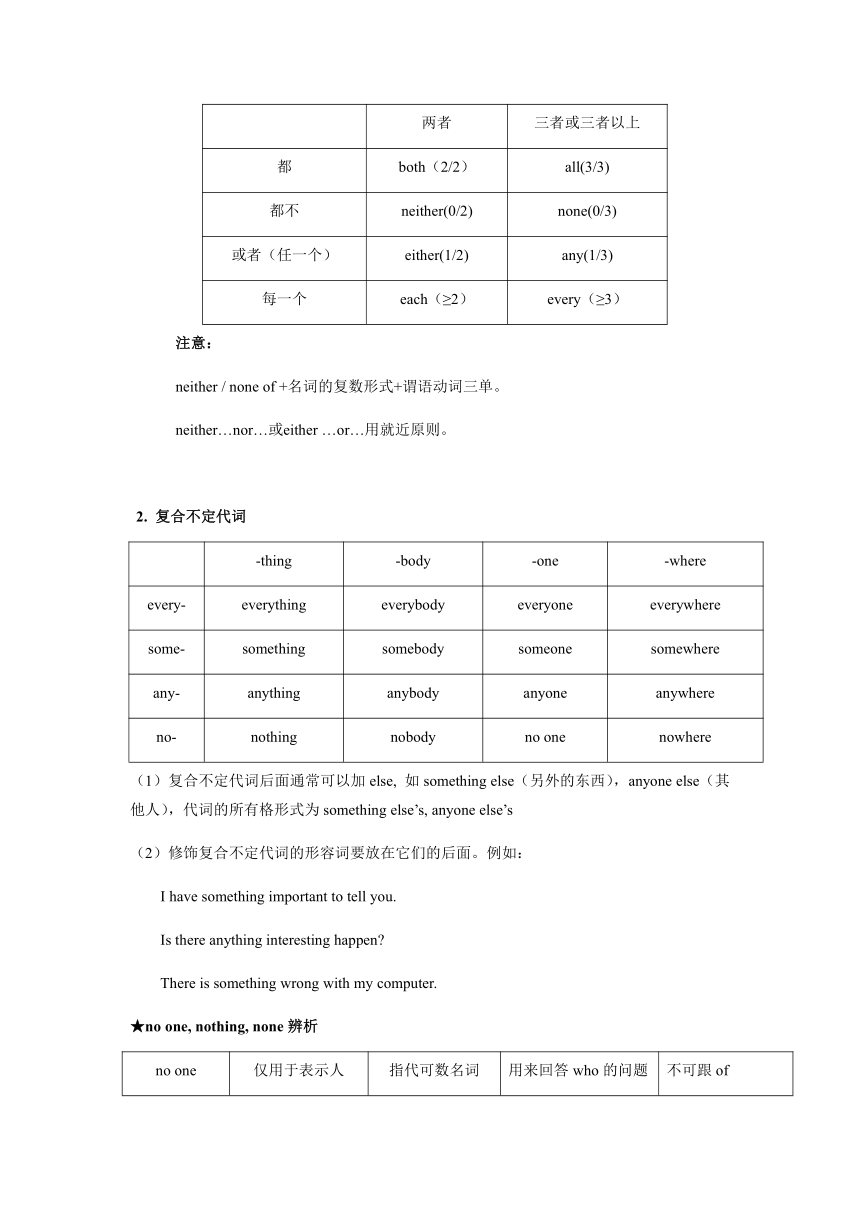
文档简介
代词精讲及巩固提升练习
概念
代词是代替名词的一种词,中考要求学生主要掌握的有人称代词、物主代词、反身代词、指示代词、疑问代词、不定代词和it的用法。
人称代词/物主代词/反身代词
我
你
他
她
主格
I
you
he
she
宾格
me
you
him
her
形容词性物主代词
my
your
his
her
名词性物主代词
mine
yours
his
hers
反身代词
myself
yourself
himself
herself
我们
你们
他们
它
主格
we
you
they
it
宾格
us
you
them
it
形容词性物主代词
our
your
their
its
名词性物主代词
ours
yours
theirs
its
反身代词
ourselves
yourselves
themselves
itself
注意:
(1)主格与宾格:人称代词主格作主语,宾格作宾语,例如:
Mr. Wang teaches us English.
(2)人称代词的顺序:口诀:单数二三一,复数一二三,受到批评我在前,承认错误你在后。
单数:you+he/she+I
复数:we+you+they 例如:
You, he and I are all the winners.
We, you and they are three groups.
I, Li lei and you are wrong. We should do more for the project.
(3)名词性物主代词可以用在of 后做定语,相当于“of+名词所有格”表示带有部分概念或有一定的感彩。
He is a friend of mine. 他是我的一位朋友。
名词性物主代词相当于“形容词性物主代词+名词”,在句子中起名词的作用,可单独使用。例
Ours(Our city) is an international city.
I forgot to take my umbrella. May I share yours(=your umbrella)?
- Whose pen is this?
- It’s hers.
(5)反身代词还和一些动词或介词构成固定搭配。
teach oneself 自学
be pleased with oneself 对自己满意
by oneself 单独地,独自地
enjoy oneself=have a good time =have fun 玩的高兴
lose oneself 专心于某事,埋头于某事
help oneself to 随便吃
look after oneself 照顾自己
(6)物主代词用于固定搭配的词组
on one’s own 独自
hold one’s breath 屏住呼吸
on one’s way to... 去……的路上
to one’s surprise 使某人吃惊的是
try one’s best to do... 尽全力做……
make up one’s mind to do... 下定决心做……
it的用法
代替前面提到的事物。
-Where is the book?
-The one with V-neck.
The old houses have been pulled down, and lots of new ones will be built.
作主语,表示时间、距离、天气等。
It’s time for us to have lunch.
指婴儿或不知道对方是谁。
It’s a lovely baby.
- There is a knock at the door. Who is it?
- It’s me.
做形式主语。
It is important to learn English.
指示代词
表示时间和空间远近关系的代词叫指示代词。
这,这个
那,那个
这些
那些
this
that
these
those
注意:
有时为了避免重复提到的名词,常可用that 或those 代替。
Television sets made in Beijing are just as good as those made in Shanghai.
this 在电话用语中代表自己,that 则代表对方。
Hello! This is Mary. Is that Jack speaking?
疑问代词
疑问代词有who,whom,whose,what 和which 等。疑问代词用于特殊疑问句中,一般都放在句首,并在句子中作为某一句子成分。例如:
疑问代词
意思
用法
who
谁
问人
whose
谁的
问主人
whom
谁
问人(宾语)
which
哪一个
问选择
what
什么
问东西、事物
不定代词
不是指明代替任何特定名词的代词叫做不定代词,在句中可作主语、表语、宾语和定语。不定代词没有确定的对象,常用的有:
all, each, every, both, either, neither, one, none, little, few, many, much, other, another, some, any, no 以及由some, no, any, every 构成的复合词。
both/all, each/every
两者
三者或三者以上
都
both(2/2)
all(3/3)
都不
neither(0/2)
none(0/3)
或者(任一个)
either(1/2)
any(1/3)
每一个
each(≥2)
every(≥3)
注意:
neither / none of +名词的复数形式+谓语动词三单。
neither…nor…或either …or…用就近原则。
复合不定代词
-thing
-body
-one
-where
every-
everything
everybody
everyone
everywhere
some-
something
somebody
someone
somewhere
any-
anything
anybody
anyone
anywhere
no-
nothing
nobody
no one
nowhere
复合不定代词后面通常可以加else, 如something else(另外的东西),anyone else(其他人),代词的所有格形式为something else’s, anyone else’s
修饰复合不定代词的形容词要放在它们的后面。例如:
I have something important to tell you.
Is there anything interesting happen?
There is something wrong with my computer.
★no one, nothing, none辨析
no one
仅用于表示人
指代可数名词
用来回答who的问题
不可跟of
nothing
仅用于表示物
指代不可数名词
用来回答what问题
不可跟of
none
可用于表示人或物
指代可数或不可数名词
用来回答how many/how much问题
可跟of
None of these shoes fit/fits me well.
--Who stayed in the classroom?
--No one.
--What’s in the box?
--Nothing.
--How much money have you got?
--None.
one, other/anther
one
指不定的人或物,ones是复数形式
other
用作单数或修饰单数时,前面必须加the;常与one连用:one...and the other...;
other的复数是others,表示“其他的人或物”。
another
表示“另一个人或物”或“再来一个”。
★one...the other: 特指两个之中的“一个……另一个……”。例如:
I have two uncles. One is a teacher and the other is a farmer.
★one...the others/the other+名词复数:特指三个或三个以上的情况,“一个……另一些/另几个……”。例:There are four boys in the classroom. One is reading. The others are talking.
There are five flowers in the vase. One is purple. The other four ones are red.
★some...the others/some...others
some...the others 是指在一个特定的范围内,“一些……,另一些/其余的……”
some……others 是指比较泛的范围内,“一些……,别的一些……”。它们通常用来描述有很多人或事物的场面,表示不完全的列举。例如:
The students are busy with the experiment. Some are operating the machine. The others are recording the results.
Many old people are in the park. Some are walking. Others are talking about the news.
★each other/one another
each other指两个人或物之间“相互……”。
one another指三个及三个以上的人或物之间“相互……”。例如:
After the tennis match, the two players shook hands with each other.
After the football match, all the players shook hands with one another.
不定代词分组辨析
① many/much
many和much都表示“许多,很多”。many后跟可数名词,much后跟不可数名词
② some/any
some和any 都表示“一些”,既都可以和可数名词和不可数名词连用。但通常情况下,some
用在肯定句中,any用在否定句和一般疑问句中。例如:
I have got some crisps.
How much bread have you got? I haven’t got any.
☆some有时也用于疑问句,通常表示邀请、请求。例如:
Would you like some tea?
Will you buy me some cake?
★当any用在肯定句中时,表示“任何一个,无论哪个”。例如:
They’re all free-take any you like.
巩固提升:
I. Choose the best answer.
1. -- Who do the books on the shelf belong to?
-- They are ______.
A. we B. us C. our D. ours
2. Each shop has ______ own way to attract customers.
A. his B. her C. its D. my
3. Most people chose not only Jane’s plan but also ______ after the discussion.
A. I B. my C. me D. mine
4. Now I know your decision. Please ask ______ in your class about their ideas.
A. others B. the others C. other D. the other
5. The professor answered the questions one after ______ after the lecture.
A. the other B. another C. the others D. others
6. We should write on ______ sides of paper in order to save it.
A. either B. any C. all D. both
7. The girl couldn't believe her eyes when she saw ______ in the mirror.
A. her B. herself C. hers D. she
8. The twins look so similar that I always mistake the one for ______.
A. the other B. the others C. another D. other
9. -- When shall we meet, this Saturday or Sunday?
-- ______ is OK. I’m free these days.
A. Both B. Either C. All D. Neither
10. Jack is good at Chinese. He can ______ speak good Chinese ______ read and write it well.
A. not only, but also B. not, or C. either, or D. neither, or
11. O. Henry wrote a lot of novels but I’ve only read ______ of them.
A. few B. a few C. little D. a little
12. I can't use my mobile phone now. There must be ______ wrong with it.
A. something B. anything C. everything D. nothing
13. Some people may choose to live in a village, but ______ enjoy the colorful life of the city.
A. the other B. the others C. another D. others
14. The twin sisters often feel the same way but ______ of them have their own ideas now and then.
A. neither B. both C. either D. all
15. There are no empty seats on this flight, but there are ______ available on the next one.
A. few B. a few C. little D. a little
16. The teacher asked what was happening, but ______ answered. We were all silent.
A. everybody B. nobody C. somebody D. anybody
Ⅱ. Complete the sentences with the given words in their proper forms.(用所给词的适当形式填空)
1. This is not my pencil-box. ____________ (I) is in the bag.
2. Trees are planted in ____________ (we) country every year, which makes our country more and more beautiful.
3. -- Is that bike Miss Gao’s?
-- Yes, it is ____________ (she). Beautiful, isn’t it?
4. Help ____________ (you) to some fruit,Jack.
5. -- Who taught your brother to surf?
-- Nobody. He learnt all by ____________ (he).
Keys:
Ⅰ 1-5 DCDBB 6-10 DBABA 11-15 BADBB 16 B
Ⅱ 1.Mine 2.our 3.hers 4.yourself 5.himself
概念
代词是代替名词的一种词,中考要求学生主要掌握的有人称代词、物主代词、反身代词、指示代词、疑问代词、不定代词和it的用法。
人称代词/物主代词/反身代词
我
你
他
她
主格
I
you
he
she
宾格
me
you
him
her
形容词性物主代词
my
your
his
her
名词性物主代词
mine
yours
his
hers
反身代词
myself
yourself
himself
herself
我们
你们
他们
它
主格
we
you
they
it
宾格
us
you
them
it
形容词性物主代词
our
your
their
its
名词性物主代词
ours
yours
theirs
its
反身代词
ourselves
yourselves
themselves
itself
注意:
(1)主格与宾格:人称代词主格作主语,宾格作宾语,例如:
Mr. Wang teaches us English.
(2)人称代词的顺序:口诀:单数二三一,复数一二三,受到批评我在前,承认错误你在后。
单数:you+he/she+I
复数:we+you+they 例如:
You, he and I are all the winners.
We, you and they are three groups.
I, Li lei and you are wrong. We should do more for the project.
(3)名词性物主代词可以用在of 后做定语,相当于“of+名词所有格”表示带有部分概念或有一定的感彩。
He is a friend of mine. 他是我的一位朋友。
名词性物主代词相当于“形容词性物主代词+名词”,在句子中起名词的作用,可单独使用。例
Ours(Our city) is an international city.
I forgot to take my umbrella. May I share yours(=your umbrella)?
- Whose pen is this?
- It’s hers.
(5)反身代词还和一些动词或介词构成固定搭配。
teach oneself 自学
be pleased with oneself 对自己满意
by oneself 单独地,独自地
enjoy oneself=have a good time =have fun 玩的高兴
lose oneself 专心于某事,埋头于某事
help oneself to 随便吃
look after oneself 照顾自己
(6)物主代词用于固定搭配的词组
on one’s own 独自
hold one’s breath 屏住呼吸
on one’s way to... 去……的路上
to one’s surprise 使某人吃惊的是
try one’s best to do... 尽全力做……
make up one’s mind to do... 下定决心做……
it的用法
代替前面提到的事物。
-Where is the book?
-The one with V-neck.
The old houses have been pulled down, and lots of new ones will be built.
作主语,表示时间、距离、天气等。
It’s time for us to have lunch.
指婴儿或不知道对方是谁。
It’s a lovely baby.
- There is a knock at the door. Who is it?
- It’s me.
做形式主语。
It is important to learn English.
指示代词
表示时间和空间远近关系的代词叫指示代词。
这,这个
那,那个
这些
那些
this
that
these
those
注意:
有时为了避免重复提到的名词,常可用that 或those 代替。
Television sets made in Beijing are just as good as those made in Shanghai.
this 在电话用语中代表自己,that 则代表对方。
Hello! This is Mary. Is that Jack speaking?
疑问代词
疑问代词有who,whom,whose,what 和which 等。疑问代词用于特殊疑问句中,一般都放在句首,并在句子中作为某一句子成分。例如:
疑问代词
意思
用法
who
谁
问人
whose
谁的
问主人
whom
谁
问人(宾语)
which
哪一个
问选择
what
什么
问东西、事物
不定代词
不是指明代替任何特定名词的代词叫做不定代词,在句中可作主语、表语、宾语和定语。不定代词没有确定的对象,常用的有:
all, each, every, both, either, neither, one, none, little, few, many, much, other, another, some, any, no 以及由some, no, any, every 构成的复合词。
both/all, each/every
两者
三者或三者以上
都
both(2/2)
all(3/3)
都不
neither(0/2)
none(0/3)
或者(任一个)
either(1/2)
any(1/3)
每一个
each(≥2)
every(≥3)
注意:
neither / none of +名词的复数形式+谓语动词三单。
neither…nor…或either …or…用就近原则。
复合不定代词
-thing
-body
-one
-where
every-
everything
everybody
everyone
everywhere
some-
something
somebody
someone
somewhere
any-
anything
anybody
anyone
anywhere
no-
nothing
nobody
no one
nowhere
复合不定代词后面通常可以加else, 如something else(另外的东西),anyone else(其他人),代词的所有格形式为something else’s, anyone else’s
修饰复合不定代词的形容词要放在它们的后面。例如:
I have something important to tell you.
Is there anything interesting happen?
There is something wrong with my computer.
★no one, nothing, none辨析
no one
仅用于表示人
指代可数名词
用来回答who的问题
不可跟of
nothing
仅用于表示物
指代不可数名词
用来回答what问题
不可跟of
none
可用于表示人或物
指代可数或不可数名词
用来回答how many/how much问题
可跟of
None of these shoes fit/fits me well.
--Who stayed in the classroom?
--No one.
--What’s in the box?
--Nothing.
--How much money have you got?
--None.
one, other/anther
one
指不定的人或物,ones是复数形式
other
用作单数或修饰单数时,前面必须加the;常与one连用:one...and the other...;
other的复数是others,表示“其他的人或物”。
another
表示“另一个人或物”或“再来一个”。
★one...the other: 特指两个之中的“一个……另一个……”。例如:
I have two uncles. One is a teacher and the other is a farmer.
★one...the others/the other+名词复数:特指三个或三个以上的情况,“一个……另一些/另几个……”。例:There are four boys in the classroom. One is reading. The others are talking.
There are five flowers in the vase. One is purple. The other four ones are red.
★some...the others/some...others
some...the others 是指在一个特定的范围内,“一些……,另一些/其余的……”
some……others 是指比较泛的范围内,“一些……,别的一些……”。它们通常用来描述有很多人或事物的场面,表示不完全的列举。例如:
The students are busy with the experiment. Some are operating the machine. The others are recording the results.
Many old people are in the park. Some are walking. Others are talking about the news.
★each other/one another
each other指两个人或物之间“相互……”。
one another指三个及三个以上的人或物之间“相互……”。例如:
After the tennis match, the two players shook hands with each other.
After the football match, all the players shook hands with one another.
不定代词分组辨析
① many/much
many和much都表示“许多,很多”。many后跟可数名词,much后跟不可数名词
② some/any
some和any 都表示“一些”,既都可以和可数名词和不可数名词连用。但通常情况下,some
用在肯定句中,any用在否定句和一般疑问句中。例如:
I have got some crisps.
How much bread have you got? I haven’t got any.
☆some有时也用于疑问句,通常表示邀请、请求。例如:
Would you like some tea?
Will you buy me some cake?
★当any用在肯定句中时,表示“任何一个,无论哪个”。例如:
They’re all free-take any you like.
巩固提升:
I. Choose the best answer.
1. -- Who do the books on the shelf belong to?
-- They are ______.
A. we B. us C. our D. ours
2. Each shop has ______ own way to attract customers.
A. his B. her C. its D. my
3. Most people chose not only Jane’s plan but also ______ after the discussion.
A. I B. my C. me D. mine
4. Now I know your decision. Please ask ______ in your class about their ideas.
A. others B. the others C. other D. the other
5. The professor answered the questions one after ______ after the lecture.
A. the other B. another C. the others D. others
6. We should write on ______ sides of paper in order to save it.
A. either B. any C. all D. both
7. The girl couldn't believe her eyes when she saw ______ in the mirror.
A. her B. herself C. hers D. she
8. The twins look so similar that I always mistake the one for ______.
A. the other B. the others C. another D. other
9. -- When shall we meet, this Saturday or Sunday?
-- ______ is OK. I’m free these days.
A. Both B. Either C. All D. Neither
10. Jack is good at Chinese. He can ______ speak good Chinese ______ read and write it well.
A. not only, but also B. not, or C. either, or D. neither, or
11. O. Henry wrote a lot of novels but I’ve only read ______ of them.
A. few B. a few C. little D. a little
12. I can't use my mobile phone now. There must be ______ wrong with it.
A. something B. anything C. everything D. nothing
13. Some people may choose to live in a village, but ______ enjoy the colorful life of the city.
A. the other B. the others C. another D. others
14. The twin sisters often feel the same way but ______ of them have their own ideas now and then.
A. neither B. both C. either D. all
15. There are no empty seats on this flight, but there are ______ available on the next one.
A. few B. a few C. little D. a little
16. The teacher asked what was happening, but ______ answered. We were all silent.
A. everybody B. nobody C. somebody D. anybody
Ⅱ. Complete the sentences with the given words in their proper forms.(用所给词的适当形式填空)
1. This is not my pencil-box. ____________ (I) is in the bag.
2. Trees are planted in ____________ (we) country every year, which makes our country more and more beautiful.
3. -- Is that bike Miss Gao’s?
-- Yes, it is ____________ (she). Beautiful, isn’t it?
4. Help ____________ (you) to some fruit,Jack.
5. -- Who taught your brother to surf?
-- Nobody. He learnt all by ____________ (he).
Keys:
Ⅰ 1-5 DCDBB 6-10 DBABA 11-15 BADBB 16 B
Ⅱ 1.Mine 2.our 3.hers 4.yourself 5.himself
